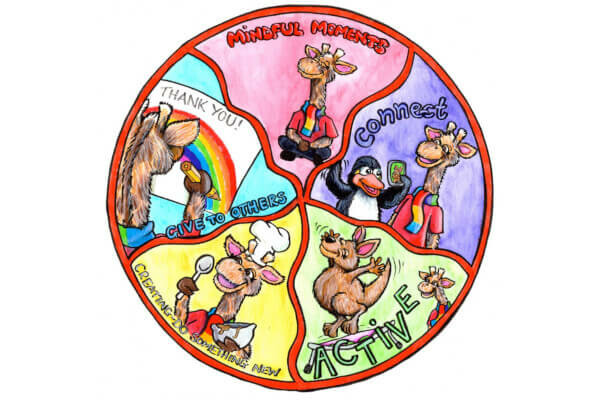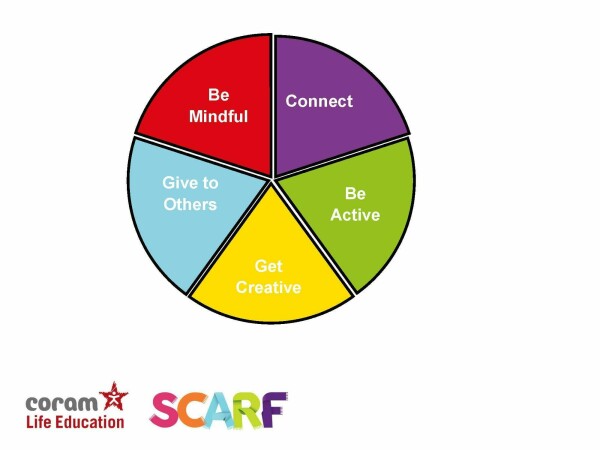Wellbeing and our Wellbeing Ambassadors
What is Wellbeing and mental health?
Wellbeing and mental health refers to our emotional, psychological, and social well-being. It is all about how we think, feel, and behave. Wellbeing is not the same as happiness – though happiness is a part of it. The UK Government’s wellbeing and health policy describes “Wellbeing is about feeling good and functioning well and comprises an individual’s experience of their life; and a comparison of life circumstances with social norms and values. It is the ability to ride out challenges and difficulties and includes security and confidence that the future will turn out well.”
Our wellbeing also helps determine how we handle stress, relate to others and make choices. Mental health is important at every stage of life, from childhood and adolescence through to adulthood.
Over the course of our life if you experience mental health problems, your thinking, mood, and behaviour could be affected. Many factors contribute to mental health problems, including:
- Biological factors, such as genes or brain chemistry
- Life experiences, such as trauma or abuse
- Family history of mental health problems
Mental health problems are common but help is available. People with mental health problems can get better and many recover completely.
Our wellbeing Ambassadors
Our Wellbeing Ambassadors are voted for by their peers at the beginning of the school year. Their role is to amplify pupil voice on whole school wellbeing and empower young leaders to promote and support wellbeing within their school community. This year our Wellbeing Ambassadors have been trained through Eikon and have been supported to have the knowledge, skills and confidence to initiate and lead activities, campaigns and events that ultimately create a positive, supportive and resilient environment at school.
Across the school, all children are encouraged to support their own wellbeing through the Five Ways to Wellbeing. These Five Ways help children to explore what wellbeing is, why it’s important and how to improve it.

Early warning signs of mental health difficulties
Here is a list of some feelings and behaviours which can be an early warning sign that you might be struggling with your mental health. Don't worry, there's lots of help available.
-
Eating or sleeping too much or too little
-
Having little or no energy
-
Feeling helpless or hopeless
-
Pulling away from family, friends and activities that you usually enjoy
-
Shouting or arguing with family and friends
-
Feeling more upset, worried, angry, forgetful, confused or scared than usual
-
Feeling numb or like nothing matters
-
Having unexplained aches and pains
-
Thinking of harming yourself or other people
-
Experiencing severe mood swings that cause problems in relationships
-
Smoking, drinking, or using drugs more than usual
-
Hearing voices or believing things that are not true
-
Worrying about things that don't usually worry you
-
Having thoughts and memories that you can't get out of your head.
WELLBEING wHEEL
For more information on our 'Wellbeing Wheel', please click here.

The Hermitage School Mental Health and Wellbeing POLicy
Mental Health and Wellbeing Policy
Useful Resources
When you child is struggling, or just not feeling great, it can be hard for them to remember the help strategies that they have been taught. Mindworks have created some helpsheets (links below) that may be helpful to look at when your child is in need of some support.
It can also be helpful to look at these pages when they are not struggling so that they feel more confident to use these strategies if things get more difficult. It may be helpful to share these helpsheets with friends and family, the people who care about them, so that they can remind children of these strategies too.
Looking after yourself - self care
Neurodevelopmental needs and resources
Other resources for parents, including managing emotions on the school run
Please find further links to websites below that can give you further advice to support your child's wellbeing and mental health.
The Children and Young People's Emotional Wellbeing and Mental Health Service
Getting help in a mental health crisis
Child Mental Health & Wellbeing - 10 Top Tips for Parents
Parents' Mental Health & Wellbeing - 10 Top Tips for Parents

